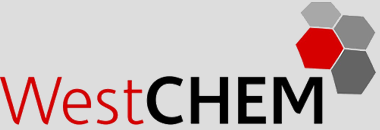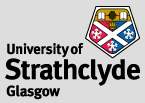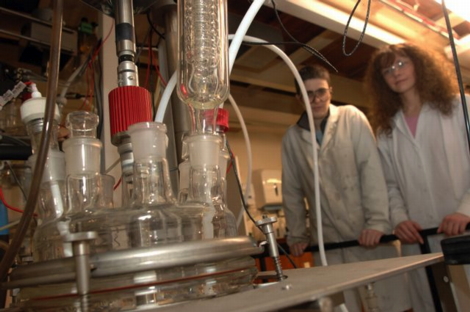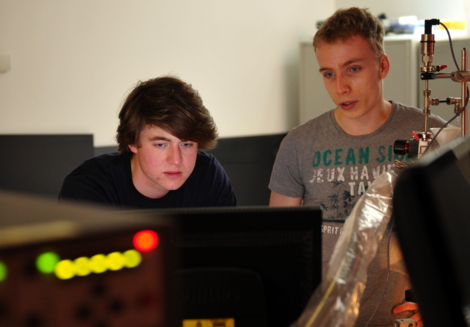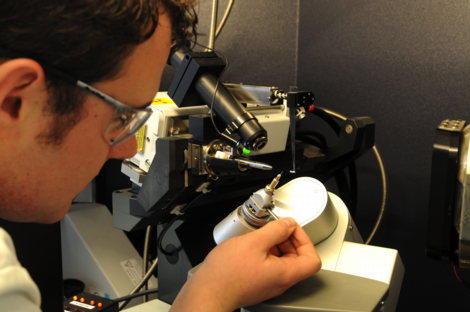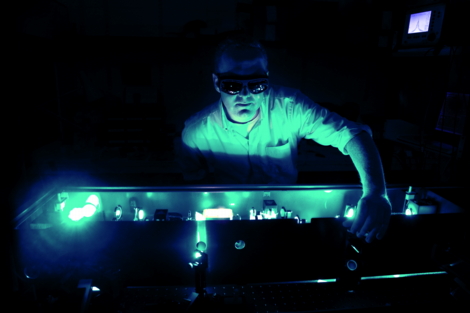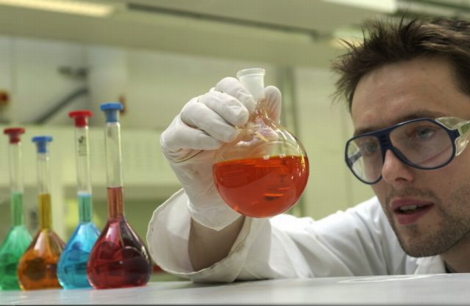Research Themes
WestCHEM research cuts across the full range of topics in modern chemistry, and is grouped into six general areas: Catalysis & Synthesis | Chemical Biology & Medicinal Chemistry | Complex Chemical Systems | Dynamics and structure | Nanoscience & Materials Chemistry
Catalysis & Synthesis
The grouping specialises in homogeneous catalysis, heterogeneous catalysis, target-driven synthesis, computational chemistry, and emerging new developments in digital synthesis and reactionware. The grouping performs research into asymmetric catalysis for the synthesis of chiral compounds and in particular bioactive targets; solid-supported catalysts for industrial applications such as petrochemicals, fine chemicals and fuels; total synthesis of natural products, pharmaceuticals, agrochemicals, and biological probes; and computer simulation studies of catalytic reactions. Notable breakthroughs span a broad range, from the design of new reactions and mechanistic studies to the synthesis of complex natural products, and from metal-free reagents to important metal-based transformations and the emerging area of synergistic bimetallic chemistry. The grouping has strong international links and collaborates with more than 25 companies, e.g., GSK, Merck, and Huntsman.
Topics include:
Key staff members:
Websites: Catalysis Research at GU, Synthesis & catalysis at SU |
|
Chemical Biology & Medicinal Chemistry
All of the molecular and biological sciences are present within the City of Glasgow and this has led to an exceptionally strong biomedical research environment that is unique in the UK. Molecular and biological sciences are fully integrated with the medical and veterinary sciences across several institutions including SU, GU, and the Beatson Institute for Cancer Research. Given the enormous potential for multidisciplinary collaboration offered by this biological and biomedical grouping, we have been building capacity in chemical biology over the past few years with major investments in both infrastructure and staff. This capacity has been recognised through an EPSRC-BBSRC-MRC funded Chemical Biology Network grant which has accelerated growth and facilitated collaboration.
Topics include:
Key staff members:
Websites: Chemical Biology & Medicinal Chemistry at GU, Chemical biology & medicinal chemistry at SU |
|
Complex Chemical Systems
This grouping addresses the major challenge of the self-assembly of non-biological chemical components into complex structures that have unique properties, such as adaptability, molecular recognition, and programmability. The interplay between chemical systems and hybrid devices that have the potential to deliver revolutionary new technologies based on inorganic biology and synthetic systems is also being addressed. Applications range from the development of adaptive materials for biomedical applications, strategies for solar fuel devices, clean water, to the production of potential drug and drug delivery candidates.
Topics include:
Key staff members: Websites: Cronin group at GU |
|
Dynamics and structure
Research in this grouping addresses the physical aspects of chemistry and focuses on ultrafast chemical physics, the use of chiral photonic and meta-materials for biosensing, investigation of biomolecular structure and dynamics, synthesis and evaluation of organic electronics, solid-state chemistry, polymer chemistry, and computational chemistry. The group is growing its activities in soft condensed matter theory and experiment; the interface between biology and chemical physics studied through spectroscopy and imaging; and solid-state physical chemistry. This strategy has been supported with investment in infrastructure and staff to enhance the group’s vitality and international standing.
Topics include:
Key staff members:
Web sites: Dynamics & Structure at GU, Dynamics & structure at SU |
|
Nanoscience & Materials Chemistry
The Centre for Molecular Nanometrology is pioneering the fundamental understanding of plasmonic materials for enhanced optical spectroscopies and the creation of new approaches to bioanalysis, based predominantly on functionalised nanoparticles and surface enhanced Raman scattering. The grouping’s materials research is internationally leading in renewable energy applications (fuel cells, hydrogen storage, solar cells), low power optoelectronic devices, chiral plasmonic metamaterials, and magnetic materials. It has wide-ranging capability in inorganic, organic and polymer synthesis, and combines this expertise with device work conducted in-house and through external academic collaborations and industry.
Topics include:
Key staff members:
Websites: Nanoscience and Materials at GU, Nanoscience & materials at SU |
|
